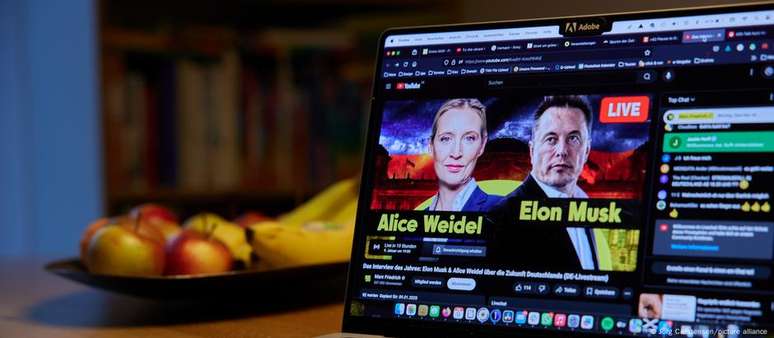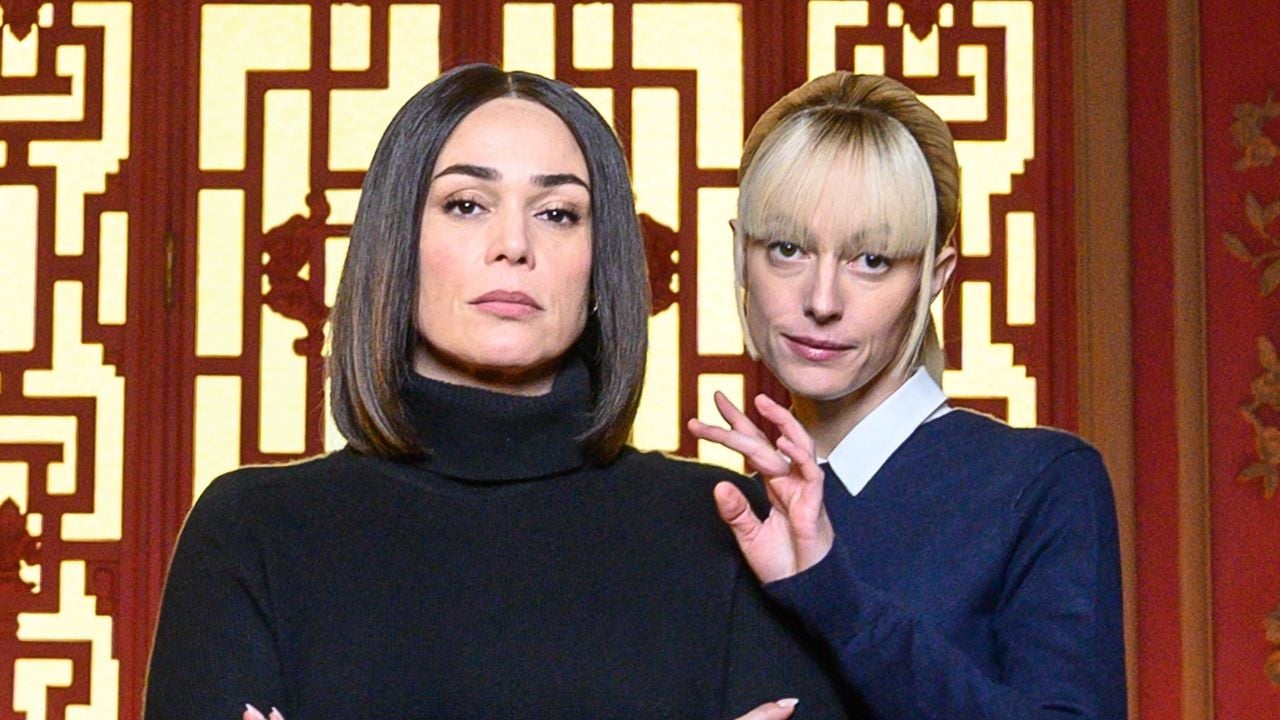The chat with the AfD candidate is part of the billionaire’s offensive to influence the country’s elections less than two months before the vote. The conversation with Alice Weidel is critical of the government, the press and politics. Billionaire Elon Musk held a live broadcast on his social media platform this Thursday (09/01) Germany (AfD), Alice Weidel, candidate to head the government in the general elections of February 23.
Musk’s involvement in the German elections raises concerns across Europe, including regarding possible interference by the owners of X, Tesla and SpaceX in the electoral process.
After supporting Donald Trump in the US elections and opening negotiations to finance populists in the UK, Musk turned his attention to the upcoming German federal elections, stating several times that “only the AfD can save Germany” – a phrase that he repeated in this Thursday’s live broadcast – fair.
This support has been celebrated and repeated countless times by the leaders of the party, which is regularly accused of harboring neo-Nazis and which has several state directorates carefully monitored by the secret services because they are suspected of violating constitutional values.
A few days ago Musk published an article in the German newspaper Welt am Sonntag in which he stated that the AfD would be “the last spark of hope” for Germany. He said the country, under the government of centre-left Chancellor Olaf Scholz, was “teetering on the brink of economic and cultural collapse”.
In December, Musk called Scholz an “incompetent fool” and said German President Frank-Walter Steinmeier was an “anti-democratic tyrant.”
Criticism of Merkel
In the live broadcast, followed by more than 200,000 profiles on X, Musk and Weidel addressed a series of controversial topics.
In the first part of the conversation the two discussed German energy policy. The far right has called former Chancellor Angela Merkel “Germany’s first green chancellor,” apparently in reference to her efforts toward renewable energy, a movement that began long before Merkel’s tenure. The former chancellor belongs to the traditional conservative Christian Democratic Union (CDU) party.
Weidel criticized Germany’s abandonment of nuclear energy and investment in solar and wind energy, and said Germany’s dependence on Russian natural gas was highlighted during the invasion of Ukraine, criticizing the temporary use of coal to fill energy gaps.
However, Weidel omitted that his party – considered pro-Russian – defends coal plants and the supply of Germany with Russian gas, as well as the resumption of nuclear energy.
The AfD leader said Merkel had “ruined” the country, mainly because of her actions during the 2015 migration crisis, when hundreds of thousands of migrants arrived in the country, fleeing wars and poverty in countries such as Syria , Afghanistan and Iraq.
The pair also addressed topics such as German students’ low grades in international studies such as Pisa, with Weidel arguing that the decline in German grades could be attributed to factors such as “socialist gender issues” taking up too much time in lessons.
Hitler “communist”?
At one point, Musk alluded to Germany’s Nazi past and asked Weidel to comment on the commonly made association between the AfD and the far right.
She complained about the public treatment of her party by Germany’s mainstream media and said that the “libertarian” alternative represented by the AfD has been unfairly labeled as far-right, although there are numerous factors that allow for this interpretation.
Weidel also falsely stated that Adolf Hitler himself was not right-wing, but left-wing, and that proof of this would be the fact that the Nazi regime identified its ideology as “National Socialism”, taking up a thesis already widely debated and denied by experts, even Brazilians, that Nazism would be left-wing.
Referring to the Nazi regime’s economic policies and huge expenditures in rearming Germany and preparing it for war with much of Europe, Weidel argued that the word that defined Hitler and the Nazis was “socialist,” not “national.”
However, Hitler himself stated at the time that he wanted to save the term “socialism” from the way it was being used by Marxists who, he said, were obscuring what could have been a viable basis for state economic policy.
During Nazism, communists and socialists were systematically persecuted and repressed. Part of Nazi propaganda was based on antagonism with the “red evil” represented by communism, whose spearheads would be the Jews and the Soviets.
Antisemitism
Musk and Weidel said they were concerned about the rise of anti-Semitism, signaling a contrast with some of the billionaire’s previous attitudes. In 2023, he endorsed a post on X in which he falsely claimed that members of the Jewish community were fueling hatred against white people.
The message also referred to a conspiracy theory that Jews supported the arrival of non-white populations in Western countries – a theory supported by the man who attacked a synagogue in Pittsburgh in 2018 and killed 11 people.
“You told the plain truth,” Musk responded to the user at the time. However, when discussing the Hamas-Israel conflict, Musk cited the proverb that “an eye for an eye leaves a man blind,” and Weidel agreed, criticizing Israel’s military action in the Gaza Strip.
The EU monitors abuse on the networks
The conversation between Musk and Weidel was closely monitored by the European Commission, which accused X of violating the bloc’s Digital Services Act (DSA). The regulation was created to control the activities of social media platforms and protect internet users from online harm.
Commission officials say Musk has the right to express his opinions, but point out that the DSA was created to contain the risk that platforms could be used to amplify illegal content, including hate speech or election-related misinformation. They also stress that the platform cannot be used to favor one party over another in the election campaign, giving it an unfair advantage in the electoral race.
Currently, a team of up to 150 employees of the entity investigates whether X is acting in compliance with European laws. They have far-reaching investigative powers that allow them to visit X’s offices, request access to its algorithm and monitor internal correspondence.
In the live broadcast with Musk, Weidel called the DSA “ridiculous” and accused the set of laws of “censoring freedom of expression.”
Musk expands influence in Europe
Musk’s forays into politics are raising alarm across Europe. In addition to supporting the AfD, Musk called for the release of British anti-Islam extremist Tommy Robinson, called British Prime Minister Keir Starmer an evil tyrant and said he should be in prison.
There are fears in Poland that Musk could use his influence to interfere in May’s presidential election.
AfD in second place in polls
The AfD has gained popularity in recent years, with opinion polls showing the party is now the second most popular in the country behind only the CDU, as the far right has ceased to be a taboo in Europe.
The Christian Democrats are the favorites to win the elections, with 31% support, according to the latest polls. The AfD, in turn, would have 20% of voting intentions, ahead of other traditional parties, such as Olaf Scholz’s Social Democratic Party (SPD) and the Greens.
The party is unlikely, however, to be part of a governing coalition, given traditional German parties’ aversion to the AfD due to the country’s traumatic experience with Nazism.
Support for the AfD has grown due to discontent with the government led by Olaf Scholz. His popularity also reflects growing frustration with the German economy and the country’s involvement in the European Union, NATO and the war in Ukraine.
rc/ra (ots)
Source: Terra
Rose James is a Gossipify movie and series reviewer known for her in-depth analysis and unique perspective on the latest releases. With a background in film studies, she provides engaging and informative reviews, and keeps readers up to date with industry trends and emerging talents.







